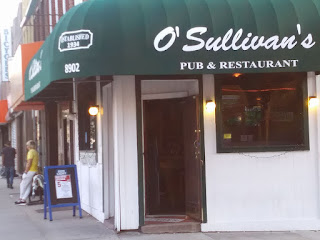The Good Man Teach His Son
Today I was fortunate enough to get a call from my niece Kristin that gave me such an emotional lift I’m still feeling it nearly 12 hours later.
I was charging my phone in the living room when she called, so I had to do a mad dash from the bedroom to pick up, but it was worth the effort.
Our conversation ran the gamut of family business, work, politics, and entertainment. At some point, I mentioned that I had just finished watching Band of Brothers, HBO’s fabulous World War II miniseries.
Band of Brothers, which was made 20 years ago, tells the story of Easy Company of the U.S. Army 101st Airborne Division as they parachute behind enemy lines in the early hours of D-Day.
My father was a veteran of the war and I was anxious to see how the series compared with the stories he had told me while I was growing up.
I’ve watched the series over the last three weeks and each time I took the DVD out of the machine, I felt this sadness come over me as I thought about what my father must have experienced while he was overseas.
He survived artillery attacks and ferocious battles, he saw his friends killed before his eyes, and he lived every single day with the gnawing fear that it might be his last.
How could you possibly expect someone to remain emotionally intact after going through that kind of hell?
"We Happy Few...'
Back then, soldiers coming home from the war were expected to put the nightmare behind them and resume their lives as if nothing had happened.
The closest people came to acknowledging post-traumatic stress disorder was the expression “battle fatigue,” which does not begin to described what was going on with these soldiers.
World War II changed the field of psychiatry radically and PTSD was recognized as an offical disorder in 1980.
In addition to the war, my father had grown up during the Depression, when his dad had to fight to keep a roof over the family’s head and food on the table.
I was getting so depressed watching the show, as I recall the times I butted heads with my father. He was a pretty angry man, but then that’s hardly surprising given his time as a soldier and his harsh upbringing.
I wish I had been more understanding when he was alive, but that seems to be the curse of generations.
You only appreciate what your parents went through after they’ve left this world.
And that’s why Kristin’s call today was so important.
After telling her about the series, I began repeating some of my father’s old war stories.
He had told me these tales so many times I’ve gotten tattooed on my brain.
I started to feel better as I told my niece about her grandfather. I didn’t connect with him as much as I would’ve liked, but, at least, I can preserve his stories and pass them on to the next generation.
War will always be a part of our lives. People will talk on and on about ending war once and for all, but I’m afraid humans are hard-wired for self-destruction.
Each war will create more battled-scarred veterans and more stories for us to remember and pass on to our children.





Comments
Rob, that is so true! In fact, whenever I think of my father, I only recall the "great" things about him, and how much I loved (and still do) love him.
You and I are around the same age, so our fathers were both part of that time period. My father also served time in the war, but not as closely (and dangerously) as yours. I can't even imagine what that must have been like for your father. Experiences such as what he went through, stay with you forever. Like permanent scars within your psyche.
So happy to hear that you and your niece connected. Isn't it great when things like that happen? It's so therapeutic.
Have an awesome week, buddy!
I’m glad you are passing your dad’s stories on to your niece. It’s important that we don’t forget.
Hi, Bijoux!
That's incredible about your mom hearing your uncles' stories. No one comes out of a war without scars.
Take care!
Hey, buddy, what's happening?
Yes--therapeutic! That is the exact word to describe my conversation with my niece.
I like how you remember only the great things about your father. That is a very healthy approach.
Take care!
It's good that you and your niece shared memories of your father and her grandfather.
Thank you so much for sharing your experience with those old photos.
I know the feeling of having all those questions with no one around to give you answers.
My thanks to your dad and your uncles for their service during the war.
We have a pile of family photos that have no dates, no names, so I don't who these people are.
I advise people to get all that information as soon as possible because the folks who know won't always be here.
Take care.